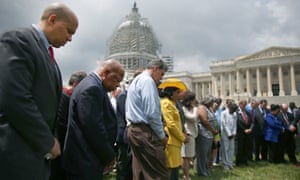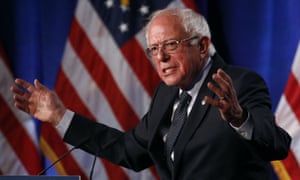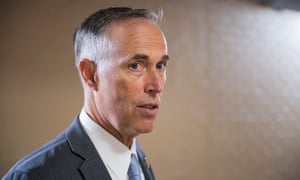Atheism
‘I prefer non-religious’: why so few US politicians come out as atheists
Non-believers remain few and far between in US politics, with atheism bringing ‘the notion of being anti-religion’, the California representative Jared Huffman explains

Photograph: Mark Wilson/Getty Images
The 2020 presidential election has produced the most diverse field of candidates in history. There are women, people of color and an openly gay man. There are billionaires, socialists and a self-help guru. The Vermont senator Bernie Sanders’ view of religion is not particularly clear but there are no known atheists.
Non-believers remain few and far between in American politics. In Congress, the only one to publicly “come out” as such is Jared Huffman, a Democrat representing California’s second district and a leading proponent of impeachment of Donald Trump.
Huffman announced in late 2017 that he is a humanist, not an atheist. In an interview at his Capitol Hill office, he characterized himself as “non-religious, humanist, spiritual albeit without any particular dogma. I’m a spiritual drifter. ‘Seeker’ would be a perfectly good word, too.”
Asked how he would define spiritual, Huffman said: “I’m interested in the morality and values that hold us together, the things that through time have really been the foundations of many religions, but I just see so much in organized religion that doesn’t work for me that I can’t really find a fit there.”
Huffman, 55, has no desire to emulate militants such as Richard Dawkins or Christopher Hitchens.
“Atheism seems to bring with it the notion of being anti-religion as opposed to non-religious,” he said. “I prefer non-religious because I just want everyone to make their own religious choices. I’m not against them having religion.
“I would never call religion categorically bad. I see too many good things happening by people of faith and even organized religion. I think Pope Francis’s encyclical was one of the most impactful statements on climate change and nature in recent times and I’ve seen other really great leadership on important moral issues from people of faith. I’ve seen a lot of lousy, immoral stuff as well. So it’s just a mix.”
A Gallup poll published in May tested Americans’ willingness to vote for presidential candidates from certain groups. About 96% said they were willing to vote for a candidate who was black, followed by Catholic and Hispanic (95% each), a woman (94%), Jewish (93%), an evangelical Christian (80%), gay or lesbian (76%), under 40 (71%), Muslim (66%) and over 70 (63%).
Bottom of the table came atheist (60%), followed by the one thing considered even worse: socialist (47%). Nevertheless, the percentage of Americans willing to vote for an atheist was more than three times the 18% Gallup recorded in its first measure, in 1958.
Most of the 2020 Democratic candidates make references to their faith. Former vice-president Joe Biden, a Catholic, wears his late son Beau’s rosary on his left wrist. The Massachusetts senator Elizabeth Warren, a Methodist, said in June: “My faith animates all that I do.” South Bend’s mayor, Pete Buttigieg, an Episcopalian, has been praised for reclaiming religion for the left while Marianne Williamson has declared: “My religion is Judaism, my spirituality is universal.”

Sanders, who is Jewish, is a more ambiguous case. During the 2016 campaign, leaked emails revealed that a Democratic official considered raising the question of whether Sanders is an atheist in the hope of weakening him against Hillary Clinton. Sanders told the Washington Post that year he was “not actively involved with organised religion” but added: “I think everyone believes in God in their own ways. To me, it means that all of us are connected, all of life is connected, and that we are all tied together.”
So what would happen if a 2020 candidate came out as a non-believer?
“I think they would suffer withering criticism,” Huffman said. “There still is, at the national political level, this notion that you have to put some kind of faith out there. I’m not saying that anybody’s faking it in the presidential field but there still is this notion that’s one of the threshold things you have to do.”
‘A respectful conversation’
In Congress, too, Christians are still overrepresented when compared with the general public, according to the Pew Research Center. About 23% of the public say they are atheist, agnostic or “nothing in particular”.
The number of non-Christian members of Congress is now 63, Pew says, made up of 34 Jews, three Muslims, three Hindus, two Buddhists, two Unitarian Universalists, and 19, including the Arizona senator Kyrsten Sinema, who decline to specify a religious affiliation.
Huffman, who falls in the last category, gets along with some colleagues better than others.
He said: “It’s a respectful conversation on both sides. We talk about spirituality and religiosity. Juan Vargas [a Democrat from California], for example, is a deeply religious Catholic, and we alternate between joking and having serious conversations about Christian theology and other things all the time. They’re great fun and they’re great conversations.”
With Bible belt Republicans, however, it’s tougher.
“I find that a little more tense because I think the evangelical brand is so at odds with my values right now,” he said. “The things that are being done politically in the name of evangelical Christianity I find so hypocritical and, quite frankly, irreconcilable with the teachings of Jesus Christ.
“I may not think that Jesus Christ is the divine son of God but he was a great teacher, and I’m fascinated by his teachings and there are great lessons and values in them. I can have that conversation with lots of my religious colleagues. It’s harder with the evangelicals who are on the far right and want to believe that their extrapolation of those teachings means that they’re against gay marriage, climate change is a hoax and all these other things that they manage to work into their worldview.”
There have been bipartisan moments. In June 2017, after the Republican Steve Scalise, then House majority whip, and others were shot at baseball practice, Huffman joined his colleagues in prayer.

He explained: “I hope they don’t mind and, thankfully, lightning did not strike. I don’t think there’s any harm that can come from prayer and there’s different types of prayer. There’s prayers that are moments of reflection.”
He would draw the line, however, at praying alongside members of Trump’s cabinet.
“I would feel so creeped out that I don’t think there’s a word to describe it,” he said.
Asked if he suspects Trump himself is a secret atheist, Huffman said: “I think he’s a narcissist. He worships himself.”
Huffman grew up in Independence, Missouri, the former home of Harry Truman.
Independence is also a historic hub for Mormons. Huffman used to be a member of the priesthood in the branch known as the Reorganized Church of Jesus Christ of Latter-day Saints, now the Community of Christ, whose world headquarters are in the city. But at 19, he lost faith.
“Once you deign to ask those big questions and you don’t get answers,” he said, “for many, it’s over at that point.”
Huffman does not believe in life after death but the prospect of “total emptiness for ever” that haunted the poet Philip Larkin does not appear to trouble him.
“This is all there is so we’d better make the most of it. Now, if you want to be a little more abstract, I also think that in a sense we live on through the good things we do and the people we influence and, for those that are seeking something more than just this temporal experience, I’d say that that’s what I would point to.
“But many people are obviously drawn to religion because they love the idea of an afterlife, and I hope they find it. In some ways the idea of living forever sounds kind of exhausting to me.”
‘I have many fellow travellers’
In 2007 the Democrat Pete Stark, also from northern California, announced he did not believe in God. Stark has since left Congress, but Huffman believes he is still not alone.
“I have many fellow travellers, very few publicly. I think there’s still fear of this conventional wisdom that being an atheist or agnostic or a non-believer is somehow the worst possible thing in politics. My experience has been that that’s not the case, but how you do it matters.”
Although current polls suggest America will get its first female, gay or Muslim president before its first atheist, attitudes are gradually shifting.
Robert P Jones, chief executive and founder of the Public Religion Research Institute, said: “I think Americans are slowly coming around to ‘a-theist’: it means not belief in God but doesn’t necessarily mean not religious.
“I think that is slowly seeping into the American consciousness, this more complex way of thinking about religion, and that may open up some more interesting space.”
Source: Elections - theguardian.com



